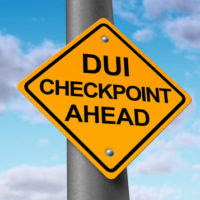DUI Checkpoints In Port St. Lucie: A Primer

Springtime is often associated with budding flowers, seasonal allergies, blossoming romance, and an uptick in criminal cases thanks to DUI roadblocks. That’s because St. Patrick’s Day and Memorial Day, two holidays commonly associated with drinking and driving, happen during this time of year.
As a general rule, Florida law enforcement agencies love roadblocks, and if it weren’t for budget constraints, they would probably run them every weekend. Checkpoints are very effective law enforcement tools, but they must adhere to some very specific rules, as outlined below.
Guidelines for DUI Roadblocks in Port St. Lucie
Many decades ago, sometimes officers could set up checkpoints at almost any time or place and sometimes they were illegal under any circumstances. In 1990, the Supreme Court finally clarified the situation in Michigan State Police v. Sitz. According to the court, these roadblocks must balance “the state’s interest in preventing accidents caused by drunk drivers, the effectiveness of sobriety checkpoints in achieving that goal, and the level of intrusion on an individual’s privacy caused by the checkpoints.” To that extent, the Justices adopted a series of rules, including:
- Prior Publicity: To give motorists the opportunity to avoid the area altogether, police departments must announce the date, location, and time of a planned roadblock several days in advance.
- Preset System: Officers cannot simply stop vehicles that look suspicious and wave everyone else through. There must be a system, such as stopping every third vehicle, that must remain in place for the duration of the checkpoint.
- Minimal Intrusion: There is no hard-and-fast rule in Florida as to how long of a wait is too long, but if motorists are stuck in traffic more than two or three minutes waiting to get through a checkpoint, that’s probably too long.
All these decisions must occur at the supervisory level. If officers at the checkpoint have any discretion as to any operational detail, the judge may invalidate the checkpoint.
What Happens at a DUI Roadblock in Port St. Lucie?
If an officer orders a car to stop at a checkpoint, the driver must produce designated items for inspection. Usually, that means a valid Florida drivers’ license and proof of insurance. There should be signs to that effect to alert drivers. Be sure you do not make any sudden moves as you retrieve these documents. Quite understandably, many officers get very nervous when they see such furtive gestures.
Florida motorists must produce these documents but they do not have to answer questions or even roll down their windows. However, if you do not interact with the officers, or suddenly turn around when you see a checkpoint ahead, an officer will probably follow you for a mile or so.
If the officer has reasonable suspicion to believe that you are intoxicated, the officer can order you to step out of the car. Such evidence includes:
- Erratic driving,
- Bloodshot eyes,
- Slurred speech, and
- Odor of alcohol.
At that point, the Port St. Lucie officer can ask you to perform field sobriety tests, such as the one-leg stand, and ask you to provide a chemical sample of breath or blood. You have the right to refuse either or both of these requests, but there may be consequences to these refusals.
Contact Tenacious Lawyers
You have rights at DUI roadblocks. For a free consultation with an experienced criminal defense attorney in Port St. Lucie, contact Eighmie Law Firm, P.A. Convenient payment plans are available.


